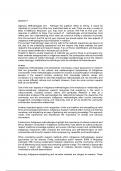Other
RSE4801ASSIGNMENT2-July2023
- Course
- Institution
- Book
1) In option 1 your response to each question should be in the form of an academic essay. Revise the guidelines on the structure of such an essay. Although the question refers to Chilisa, it would beimportant to consult the other two prescribed texts as well. There are also a ...
[Show more]




